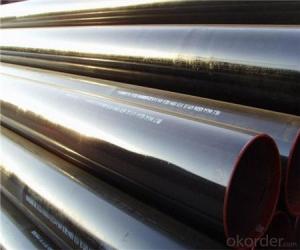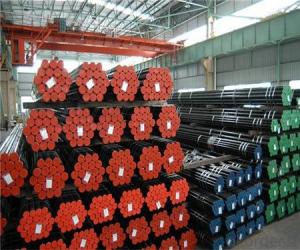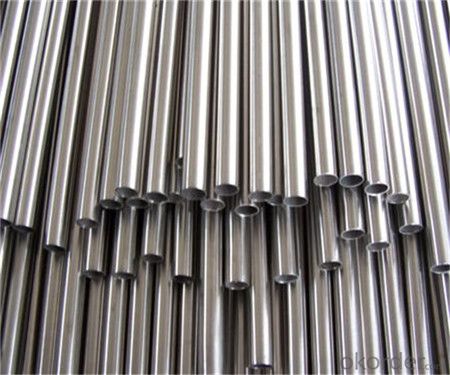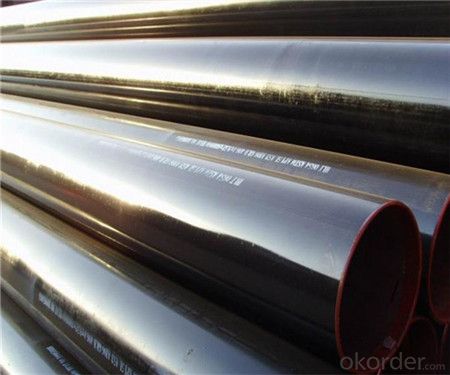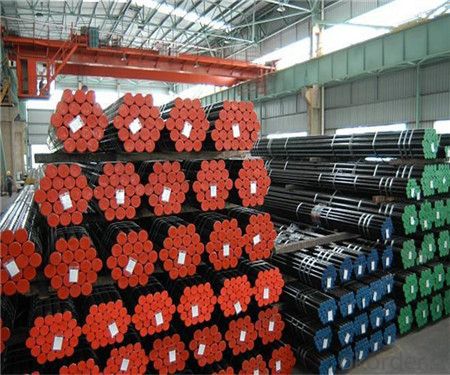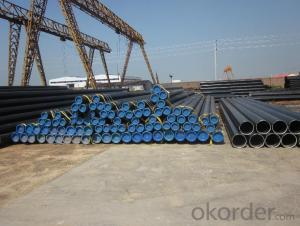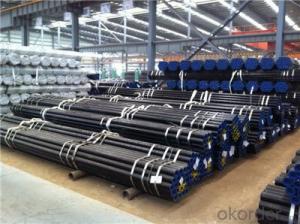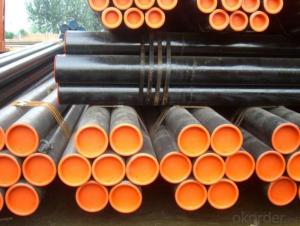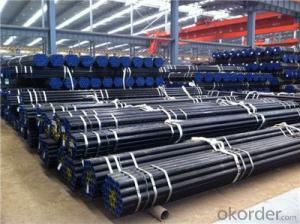Best Selling Seamless Steel pipe Made in China from CNBM
- Loading Port:
- Tianjin
- Payment Terms:
- TT OR LC
- Min Order Qty:
- 25 m.t.
- Supply Capability:
- 2000000 m.t./month
OKorder Service Pledge
OKorder Financial Service
You Might Also Like
1、Structure of Best Selling Seamless Steel pipe Made in China from CNBM:
Seamless pipe is formed by drawing a solid billet over a piercing rod to create the hollow shell. As the manufacturing process does not include any welding, seamless pipes are perceived to be stronger and more reliable. Historically seamless pipe was regarded as withstanding pressure better than other types, and was often more easily available than welded pipe.
2、Main Features of Best Selling Seamless Steel pipe Made in China from CNBM:
• High manufacturing accuracy
• High strength
• Small inertia resistance
• Strong heat dissipation ability
• Good visual effect
• Reasonable price
3、Best Selling Seamless Steel pipe Made in China from CNBM Specification:
Standard | GB, DIN, ASTM ASTM A106-2006, ASTM A53-2007 |
Grade | 10#-45#, 16Mn 10#, 20#, 45#, 16Mn |
Thickness | 8 - 33 mm |
Section Shape | Round |
Outer Diameter | 133 - 219 mm |
Place of Origin | Shandong, China (Mainland) |
Secondary Or Not | Non-secondary |
Application | Hydraulic Pipe |
Technique | Cold Drawn |
Certification | API |
Surface Treatment | factory state or painted black |
Special Pipe | API Pipe |
Alloy Or Not | Non-alloy |
Length | 5-12M |
Outer Diameter | 21.3-610mm |
Grade | 20#, 45#, Q345, API J55, API K55, API L80, API N80, API P110, A53B |
Standard | ASME, ASTM |
1) Material:20#(ASTM A 106/A53 GRB.API5LGRB,GB),45#,16Mn,10#.
2) Specification range:OD:21.3-610mm,WT:6-70mm,length:6-12m or according to the requirement of clients.
3) Excutive standards:GB,ASME API5L.ASTM A 106/A53,Despite of the above standards,we can also supply seamless steel pipe with standard of DIN,JIS,and so on,and also develop new products according to the requirements of our clients!
4) Surface:black lacquered,varnish coating or galvanized.
5) Ends:Beveled or square cut,plastic capped,painted.
6) Packing:bundles wrapped with strong steel strip,seaworthy packing.
4、Packaging & Delivery
Packaging Details: | seaworthy package,bundles wrapped with strong steel strip |
Delivery Detail: | 15-30days after received 30%TT |
5、FAQ of Best Selling Seamless Steel pipe Made in China from CNBM:
①How is the quality of your products?
Our products are manufactured strictly according to national and internaional standard, and we take a test
on every pipe before delivered out. If you want see our quality certifications and all kinds of testing report, please just ask us for it.
Guaranteed: If products’ quality don’t accord to discription as we give or the promise before you place order, we promise 100% refund.
②How about price?
Yes, we are factory and be able to give you lowest price below market one, and we have a policy that “ for saving time and absolutely honest business attitude, we quote as lowest as possible for any customer, and discount can be given according to quantity”,if you like bargain and factory price is not low enough as you think, just don’t waste your time.Please trust the quotation we would give you, it is professional one.
③Why should you chose us?
Chose happens because of quality, then price, We can give you both.Additionally, we can also offer professional products inquiry, products knowledge train(for agents), smooth goods delivery, exellent customer solution proposals.Our service formula: good quality+good price+good service=customer’s trust
SGS test is available, customer inspection before shipping is welcome, third party inspection is no problem.
6、Best Selling Seamless Steel pipe Made in China from CNBM Images:
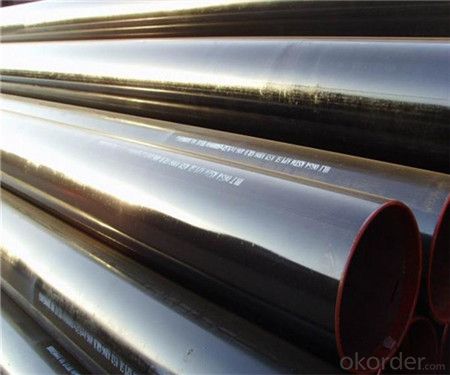
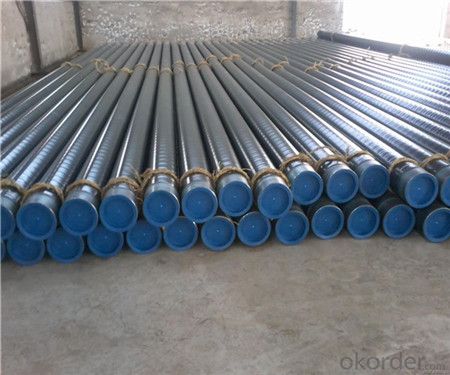
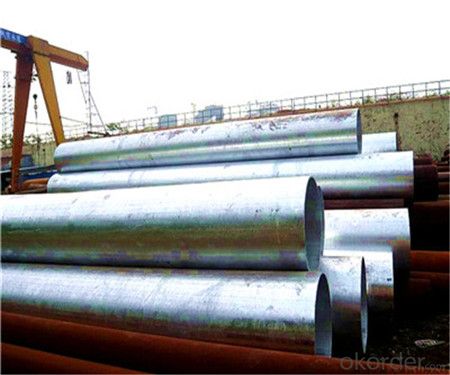
- Q: How are steel pipes used in the construction of wastewater treatment plants?
- Steel pipes are commonly used in the construction of wastewater treatment plants due to their durability, strength, and corrosion resistance. These pipes are used to transport wastewater from different points within the treatment plant, such as pipes for raw sewage, sludge, and treated water. Additionally, steel pipes are also used for structural purposes, such as supporting tanks and other equipment. Overall, steel pipes play a crucial role in the efficient and reliable operation of wastewater treatment plants.
- Q: Can steel pipes be galvanized?
- Yes, steel pipes can be galvanized.
- Q: What are steel pipes used for?
- Steel pipes are used for a wide range of applications in various industries. One of the most common uses of steel pipes is for transporting fluids and gases. They are extensively used in oil and gas pipelines to transport oil, natural gas, and other petroleum products over long distances. Steel pipes are also used in water supply systems, both for domestic and industrial purposes. In the construction industry, steel pipes are used for structural purposes. They provide excellent strength and durability, making them ideal for constructing buildings, bridges, and other infrastructure. Steel pipes are also used in the construction of high-rise buildings, as they can withstand heavy loads and provide stability. Steel pipes are widely used in the manufacturing industry as well. They are used in the production of machinery, equipment, and vehicles. Steel pipes are commonly used for conveying materials such as coal, ore, and grain in bulk handling systems. They are also used in the manufacturing of automotive parts, such as exhaust systems, chassis, and suspension components. Furthermore, steel pipes have various applications in the energy sector. They are used in power plants to transport steam and hot water, as well as in the production and distribution of electricity. Steel pipes are also used in the renewable energy sector, particularly in the construction of wind turbine towers and solar panel frameworks. In addition to these major applications, steel pipes are also used in plumbing systems, irrigation systems, and in the construction of fences and railings. They are highly versatile and can be customized to meet specific requirements in terms of size, thickness, and coating. Overall, steel pipes play a crucial role in many industries and are essential for transporting fluids, constructing infrastructure, and manufacturing various products. Their strength, durability, and versatility make them a preferred choice among engineers and professionals in different fields.
- Q: How are steel pipes insulated to prevent heat gain?
- Steel pipes are typically insulated using materials such as fiberglass, foam, or mineral wool. These insulation materials are wrapped around the steel pipes to create a barrier that reduces heat transfer. The insulation helps to prevent heat gain by minimizing thermal conductivity and keeping the temperature of the pipes stable, which is crucial for maintaining the integrity and efficiency of various industrial processes.
- Q: How are steel pipes tested for leakage?
- Steel pipes are tested for leakage using various methods, including hydrostatic testing, pneumatic testing, and ultrasonic testing. Hydrostatic testing involves filling the pipe with water or another liquid and subjecting it to high pressure to check for any leaks. Pneumatic testing, on the other hand, involves pressurizing the pipe with air or gas to detect any leakage. Ultrasonic testing utilizes sound waves to identify any defects or leaks in the pipe by measuring the time it takes for the sound waves to bounce back. These testing methods ensure that steel pipes meet the required standards and are free from any leakage.
- Q: What steel pipes are buried for outdoor heating pipes? Seamless or welded tube? Are there any rules for specific countries? Can use the seamed tube?
- Screw on the line, mainly anti-corrosion and insulation, seamless pipe caliber restrictions, so the price is high, with the most affordable screw can meet the requirements, 377 and 273 of the spiral 3920 yuan / ton, straight seam is about 4350
- Q: How are steel pipes used in the construction of water supply systems?
- Steel pipes are commonly used in the construction of water supply systems due to their durability, strength, and resistance to corrosion. These pipes are used to transport water from the source to various points of distribution, such as buildings, homes, and industries. Steel pipes are often buried underground or installed above ground, depending on the specific requirements of the project. Additionally, steel pipes can withstand high pressure and are suitable for carrying large volumes of water, making them a reliable choice for water supply systems.
- Q: What is the difference between black steel pipe and galvanized steel pipe?
- The main difference between black steel pipe and galvanized steel pipe lies in their coating. Black steel pipe is untreated and has a dark, matte appearance, while galvanized steel pipe is coated with a layer of zinc to prevent rusting and has a silver, shiny appearance. This coating makes galvanized steel pipes more durable and suitable for outdoor use, while black steel pipes are commonly used for indoor plumbing and gas lines.
- Q: How are steel pipes joined together?
- Steel pipes are often joined together using different methods such as welding, threading, and couplings. Welding involves melting the pipe ends and fusing them together, creating a strong and seamless joint. Threading involves cutting threads on the pipe ends and using fittings to screw them together. Couplings are used to connect two pipes by sliding them over the ends and tightening them with bolts or screws.
- Q: Are steel pipes suitable for use in mining applications?
- Yes, steel pipes are highly suitable for use in mining applications. Steel pipes offer excellent durability, strength, and resistance to corrosion, making them ideal for transporting various materials, such as water, gases, and minerals, in mining operations. Additionally, steel pipes can withstand high pressure and extreme temperatures, ensuring their reliability and longevity in demanding mining environments.
Send your message to us
Best Selling Seamless Steel pipe Made in China from CNBM
- Loading Port:
- Tianjin
- Payment Terms:
- TT OR LC
- Min Order Qty:
- 25 m.t.
- Supply Capability:
- 2000000 m.t./month
OKorder Service Pledge
OKorder Financial Service
Similar products
Hot products
Hot Searches
Related keywords

